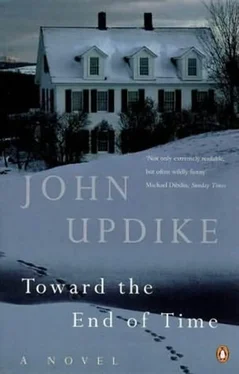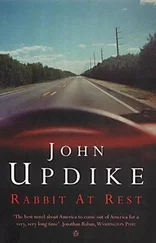John Updike - Toward the End of Time
Здесь есть возможность читать онлайн «John Updike - Toward the End of Time» весь текст электронной книги совершенно бесплатно (целиком полную версию без сокращений). В некоторых случаях можно слушать аудио, скачать через торрент в формате fb2 и присутствует краткое содержание. Жанр: Современная проза, на английском языке. Описание произведения, (предисловие) а так же отзывы посетителей доступны на портале библиотеки ЛибКат.
- Название:Toward the End of Time
- Автор:
- Жанр:
- Год:неизвестен
- ISBN:нет данных
- Рейтинг книги:3 / 5. Голосов: 1
-
Избранное:Добавить в избранное
- Отзывы:
-
Ваша оценка:
- 60
- 1
- 2
- 3
- 4
- 5
Toward the End of Time: краткое содержание, описание и аннотация
Предлагаем к чтению аннотацию, описание, краткое содержание или предисловие (зависит от того, что написал сам автор книги «Toward the End of Time»). Если вы не нашли необходимую информацию о книге — напишите в комментариях, мы постараемся отыскать её.
Toward the End of Time — читать онлайн бесплатно полную книгу (весь текст) целиком
Ниже представлен текст книги, разбитый по страницам. Система сохранения места последней прочитанной страницы, позволяет с удобством читать онлайн бесплатно книгу «Toward the End of Time», без необходимости каждый раз заново искать на чём Вы остановились. Поставьте закладку, и сможете в любой момент перейти на страницу, на которой закончили чтение.
Интервал:
Закладка:
It was she who, before dark, found the stone taken away from the sepulchre on that first Easter, and the sepulchre empty “Then she runneth,” the Gospel tells us, and met Simon Peter and “the other disciple, whom Jesus loved…” These two competitively raced to the sepulchre and concurred in its emptiness, but for the neatly folded burial linens, and raced away again. Men! Always rushing on to the next thing! Mary stayed, and wept. While weeping, she stooped and looked into the sepulchre and saw two angels, one standing at the head and the other at the feet of the empty place where the body of Jesus had lain. They asked her, “Woman, why weepest thou?”
Why indeed do women weep? They weep, it seemed to my wandering mind, for the world itself, in its beauty and waste, its mingled cruelties and kindnesses. I once saw Perdita break into tears within, I believe, the Church of San Miniato al Monte in Florence. It was a lesser sight, on the far side of the Arno, with a barrel-vaulted interior of black and white stripes, receding mistily, as I remember it, up several levels toward the altar and choir. Shocked by her tears, I touched her and asked her why, thinking I was somehow to blame. “Because it’s so beautiful,” she got out. Gloria, a reluctant weeper, nevertheless was hard to console after the death of Lily Bart in The House of Mirth -Lily, the barren heroine of a barren authoress, imagining a child nestled asleep beside her as she dies. And there were tears in Gloria’s eyes when she came into the house a spring ago announcing that the deer had eaten all her tulips. My mother, mired in poverty and boxed in by my father’s limitations, cried often in my childish witnessing, over some domestic frustration or new manifestation of bodily decay. Her teeth gave her a lot of grief, first in their twinges-so keen they started tears- and then in the disfigurements of their piecemeal loss, pathetically patched by additions to a little pink partial upper plate she kept in a water glass in the bathroom. She had been, by the evidence of old photographs, a pert, fair, small-boned and freckled country beauty, the baby of the Kimball family from Cheshire. At the kitchen table during a quarrel-my parents’ quarrels were always about the same thing, it seemed to me, about there not being enough -she would fold her arms and hide her grief-reddened face in them, terrifying me, for her face was the face of life to me, and I could not bear to have it hid. I witnessed so many tears of anger and frustration and pain on my mother’s face, there in our bleak house on the shadowy northern side of the hill on the road out of Hammond Falls, that I wonder if my heart was not permanently hardened, to save me from a lifelong paralysis of grief. Stuck it seemed forever in latency and then the helpless middle teens, I would burrow away from the family sorrows into the warm corner of the kitchen behind the wood stove, or go upstairs in summertime and lie across my narrow bed, and read science fiction- Amazing, Astounding , those cheerful pulp monthlies costing only fifty cents in the Sixties-or popularized cosmology, by Asimov or Gamow, in plastic-wrapped volumes borrowed from the Pittsfield Library. Implausibly remote, radiant, exploding facts relieved the pressure of the immediate bare facts around me-the kitchen linoleum with its black-edged worn spots, the pine thresholds so often scuffed they dipped in the middle like tired mattresses, the thin painted doors with their black latches, the beer-blurred gleam of defeat, almost crazy, in my father’s eyes when he came home later than usual from work. Giant realities-God’s facts-lifted me a bit out of it all and out of my poor skinny claustrophobic self.
The clerical collar gleamed white on the slender girlish throat of our sermonizer. It seemed a provocation, like the forms of mutilation, nipple and tongue rings and livid tattoos, with which the young scorn their own flesh and announce their scorn for us, the unpunctured and tattoo-free. Above the rustle and whining of the children I heard her preach, “Mary answered the angels that she wept because they had taken away her Lord and she did not know where they had laid him.”
One can see Mary Magdalene, over the gap of a decade less than two full millennia, giving way to a fresh gust of tears with this confession of confusion. They were young, all these disciples and camp followers of the youthful Messiah-younger than many a contemporary rock group.
Then the question was repeated, by a new figure, a man standing behind her. “Woman, why weepest thou?”
Supposing this new presence to be the gardener, in this garden near the place of crucifixion, Mary said-steadying herself now into a certain dignity, drying her streaked cheeks with the backs of her hands, not really looking at this man-“Sir, if thou have borne him hence, tell me where thou has laid him, and I will take him away.”
This carnal passion of hers for the body, though a dead body, our female exegete glides over, her little hands gracefully flitting from the sleeves of her robe.
“The strange man, whom she has mistaken for the gardener in this disorienting place, says her name: ‘Mary.’ She turns and says, ‘Rabboni,’ which is to say, ‘Master.’ At this point, she must have reached out in the joy of recognition, for He says, ‘Touch me not.’ Noli me tangere , Jesus spurns her instinctive attempt at contact. Why?”
In her expectant silence we could hear the children squirming in the creaking pews and one infant whimpering against the pressure of his mother to keep him quiet.
Superposition, I thought. Before Christ ascended, He was in what quantum theory calls superposition-neither here nor there, up nor down. He was Schrödinger’s cat.
“A little later in the same chapter,” our inquisitor preached, “Jesus invites His disciple Thomas to touch Him, to ease Thomas’s doubts. Thomas has said he will not believe in the risen Jesus unless he sees in His hands the print of the nails, and puts his own hand in the wound of sword-thrust in Jesus’s side. Jesus obliges. He lets Himself be intimately touched to ease the other man’s doubt. It is a guy thing. For Mary Magdalene, seeing must be believing. Jesus tells her not to touch Him because He is not yet ascended to the Father. He is in a fragile in-between condition. Still, He has some orders for Mary: she should go tell the disciples that He is risen. Mary obeys. Like so many women in the Bible, she accepts her subservient role and obeys. But because she needed to weep, to stay at the tomb and come to terms with her feelings, it was she and not Peter or the other disciple, whom Jesus loved, usually identified as John, son of Zebedee-it was not these but Mary who first sees the risen Christ and who hears her name pronounced by Him: ‘Mary’ For the people of Biblical times, spoken language was as good as a touch, each word lived in their ears. They didn’t have TV, they didn’t have MTV or animated holograms, for them the spoken word was the hottest entertainment around. ‘Mary.’ ‘Rabboni.’ ‘Touch me not.’”
The child in the pew ahead of me, a toddling male with: runny nose and hair much the same translucent lemon color as his snot, had become fascinated by me, and distracted me from the minister’s concluding peroration, her parallel between Mary’s confusing Easter experience and the way in which Christ sneaks up on all of us, in the morning mists, in the semblance of a gardener. Amen.
As we bowed our heads in the post-sermon prayer I was intensely conscious of the body beside mine, familiar and yet not, Deirdre’s meekly bent back sheathed in a stiff purple dress I had never seen before. I moved my elbow on the pew-back to touch hers and she pointedly moved hers away. Noli me tangere . I pictured her tan skin and supple half-shaven underparts beneath the vulgar shine of her crocus-colored dress with its starchy white collar. Her submission to this service, to the giant male ghost it bespoke, roused me. Like many of the younger women here, she wore no hat, no Easter bonnet: her “big” hair, its oiled curls inflated by a hairdresser’s patient teasing, was her headdress. Somewhere, Saint Paul devotes many verses to the vexed matter of how women should shave or cover their overexciting hair.
Читать дальшеИнтервал:
Закладка:
Похожие книги на «Toward the End of Time»
Представляем Вашему вниманию похожие книги на «Toward the End of Time» списком для выбора. Мы отобрали схожую по названию и смыслу литературу в надежде предоставить читателям больше вариантов отыскать новые, интересные, ещё непрочитанные произведения.
Обсуждение, отзывы о книге «Toward the End of Time» и просто собственные мнения читателей. Оставьте ваши комментарии, напишите, что Вы думаете о произведении, его смысле или главных героях. Укажите что конкретно понравилось, а что нет, и почему Вы так считаете.












